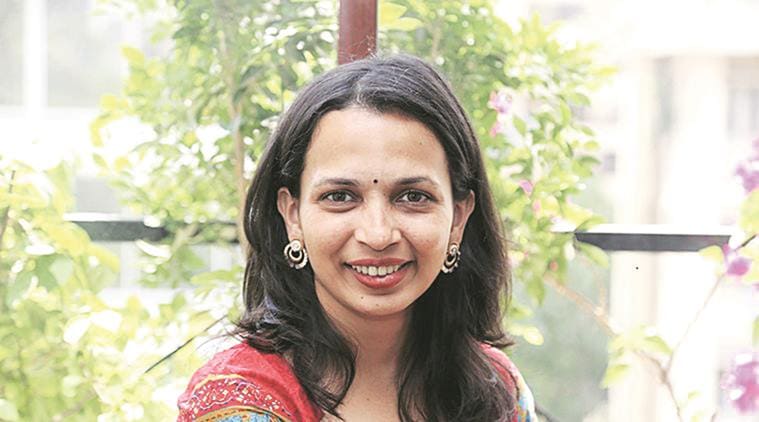Stay updated with the latest - Click here to follow us on Instagram
One-year experiment from March: Nutritionist to bring Mumbai cops into shape
The state of the Mumbai Police’s health came into the spotlight after commentator Shobha De tweeted a picture of Daulatram Jogawat, and captioned it “heavy bandobast,” in an attempted barb at the Mumbai Police.
 Celebrity nutritionist Rujuta Diwekar
Celebrity nutritionist Rujuta Diwekar
Come March, the Mumbai police will begin a one-year experiment with celebrity nutritionist Rujuta Diwekar in a bid to whip the force into shape. The plan, which was started as a pilot in the western suburbs last October, focuses on helping the police cut down on obesity, acidity and insomnia.
The state of the Mumbai Police’s health came into the spotlight after commentator Shobha De tweeted a picture of Daulatram Jogawat, a police inspector in Madhya Pradesh, and captioned it “heavy bandobast,” in an attempted barb at the Mumbai Police. Jogawat, who suffers an insulin imbalance, has been offered medical help by doctors in Mumbai.
Watch What Else Is making News
Between October and January 2017, Diwekar had personnel at eight police station located between Bandra and Andheri West in the police’s Zone 9 fill out forms detailing their daily lives — the hours they spent commuting to and from work, the number of hours they work and sleep, and most crucially, the number of cups of tea they consume.
The answers, not surprisingly, only underscored the stressful conditions that the police functions in. Policemen and women wrote back saying that their commute averages three hours, their sleep six hours, and work 14 hours.
Diwekar’s team then attended morning parades at police stations to dispense one simple tip every day. “The first month, we gave four tips on food, the month after four tips on exercise and last month, four tips on sleeping,” said Diwekar, adding that she had to ensure that the tips were doable and impactful.
The first month, Diwekar said, was spent dispelling myths and misinformation among the police about food. “Bananas make for a great breakfast, but a lot of them believed that they are fattening. In fact, they are the best thing to eat during bandobast duty,” she said.
The oral tips were followed by a series of posters stuck to the walls in each police station, the first of which advised the police to switch to bananas for breakfast to get rid of headaches and improve stamina, while others advised a short break after lunch. The most important one though, advised the police to cut down on their tea consumption. “There are so many better alternatives easily available. Sugarcane juice is very rejuvenating,” she said. The police was advised to consume lemonade, kokum sharbat and coconut water instead.
Overdoing tea and irregular meals, Diwekar said, was at the heart of police officers being racked with acidity. Diwekar’s food plan involves small meals spaced through the day, “I’d like them to eat two rotis in the morning and two for lunch. But with the unpredictable, what happens is that they skip lunch. By that time they are hungry and acidic. Then they eat a heavy dinner which results in the felling acidic and less sleep. By the time they wake up, they do not feel fresh. It was a cycle of eating one junk food after another, fasting and feasting,” she said.
Apart from advocating rotis, ghee and jaggery, Diwekar also recommended munching on peanuts in the evening to satiate hunger.
Diwekar’s tips on food, exercise and sleep have been collected into a Marathi booklet which will be launched by Commissioner Datta Padsalgikar on March 8. A senior IPS official said that it is imperative that a culture of healthy food habits be introduced in the force.
Where other initiatives by previous heads of the police force in the past decade have withered, Diwekar said that this time, it is simply a matter of persisting long enough to bring changes into practice.
“It is not that they don’t want to bring changes in fitness and health, they just don’t have the right information,” she said.
At the end of January, Diwekar had the police in zone 9 fill out exit surveys to gauge what impact the short programme made. “Every police officer in zone 9 has started implementing at least one of the twelve tips. They look leaner, acidity levels are low and sleep is better and their energy levels are up,” she said.
However, a middle-aged police constable posted in Andheri said that it isn’t always practically possible to implement Diwekar’s tips and not suited to changes in the routine work. “This plan does not address the real issue, which is a shortage of manpower. The current food plan is well intentioned but cannot be successful unless the strength of the police force is increased and an eight-hour work day is introduced,” he said.







